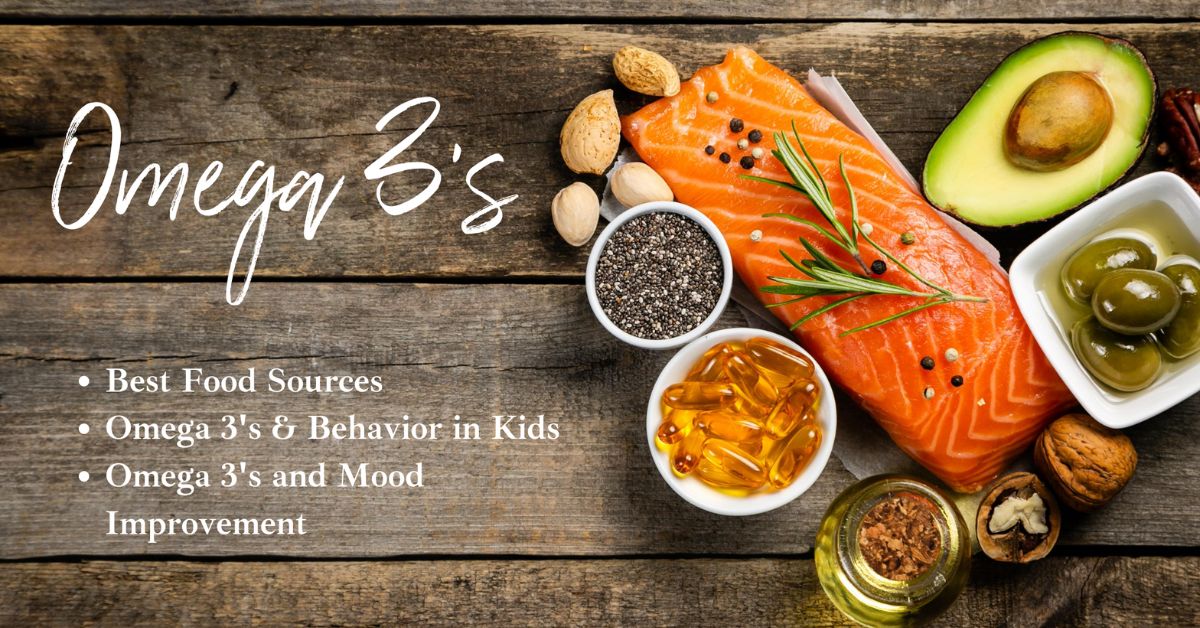What are Omega 3’s?
There are 11 different types of Omega 3’s, the 3 most important being ALA, EPA and DHA. You may have already heard of EPA and DHA which are found in fish. ALA is a plant form of ALA and must be converted to EPA and DHA to be used by the body. Omega 3’s are have a wide range of use as they are used to make signaling molecules called eicosanoids. important for regulating inflammation in the body and for the cell membranes.
Best Food Sources of Omega 3’s In Order
- Mackerel: 4-5 grams per 3.5 ounce serving
- Salmon: 4 grams per 3.5 ounce serving
- Herring: 1 gram per 3.5 ounce serving
- Oysters: 0.5 grams per 3.5 ounce serving, or 6 raw
- Sardines: 2 grams per 3.5 ounce serving
- Anchovies: 1 gram per 3.5 ounce serving
- Flax seed (ground): 2 grams per 1 TBSP
- Flax seed (liquid): 7 grams per 1 TBSP
- Chia Seeds: 5 grams per ounce
- Walnuts: 2.5 grams per ounce, or 14 raw walnut halves
- Soybeans (dry, roasted): 0.5 grams per 1/2 cup
- Soybeans: 1.5 grams per 3.5 ounces
What are some signs of Omega 3 Deficiency?
Dry scaley skin, eczema, excessive thirst, excessive urination are just a few signs. Remember that these can also be signs of other things too, but in my nutrition physical exams with people dry skin and inflammation (arthritis, chronic pain etc) are what I look for as signs of needing additional support.
Omega 3’s for Mood & Behavior
Omega 3 fatty acids are found in foods like fatty fish, chia seed, flax and walnuts. Omega-3’s are typically low in an American diet. In my practice I use omega 3 fatty acids for many chronic inflammatory disorders like rheumatoid arthritis and inflammatory bowel disease to help with reducing the ongoing inflammatory cycle. But I’ve also seen some promising use for omega-3 rich diets in supporting mood, anxiety reduction and better behavioral outcomes. Some of this is already well documented in current literature.
Support for Omega-3’s Improvement in Attention & Behavior in Children
In this study, children with hyperactivity and attention issues were given a dietary intervention (Mediterranean style diet) and additional omega 3 fatty acids. Addition of omega 3 fatty acids- Improved attention and the addition of vegetables reduced impulsivity.
Support for Omega-3’s Improvement in Mood and Anxiety Reduction (The SMILES study)
There is a great study on the same style diet (Mediterranean diet) that looked at mood shifts and anger reduction. Researchers wanted to see whether a modified Mediterranean style diet (termed the ModiMedDiet) could improve depression and anxiety scores over just a few short months as compared to a ‘social support’ control group.
Here’s what the study participants ate over 12 weeks- Based off of a traditional Mediterranean diet, designed using the Dietary Guidelines for Adults in Greece and Mediterranean diet principles from:
- Whole, unprocessed, nutrient-dense foods with ‘extras’ (sweets, processed meats, cereals) limited to less than three times per week
- Daily: Nuts, leafy greens, tomatoes, olive oil
- Moderately throughout the week: fatty fish, legumes, lean red meat
In this study, a 24.3% high rate of remission (relief) from depressive symptoms was seen with the modified Mediterranean diet. The remission rate was scored using a rating scale called MADRS (Montgomery-Asberg depression rating scale).
How to Implement Bringing More Omega-3’s into the Diet
In adults I recommend aiming for 1g-3g EPA/DHA if consuming wild caught fish, and if on a vegan diet bringing in flax, chia and walnuts in daily and in ample amounts. If you have arthritis, dry skin or a chronic inflammatory condition I typically recommend supplementing as requirements are higher in these groups.
In the study with children above, a pretty significant dose was given daily for 8 weeks (550 mg EPA, 220 mg DHA). I mention this because it might not be realistic to get your child or teen to consume fish daily- especially if it’s never been consumed before in the diet. The best advice is to start slow. Experiment with different recipes and involve the family in cooking and choosing what goes into a recipe. Or bringing in a fish oil capsule can also be useful for those not willing to eat fish.
Want extra Omega 3 support?
If you have a chronic inflammatory condition that warrants additional support or just want to supplement what you get in the diet- don’t worry I’ve got you covered. Check out Omega Pure or Omega HP.
Bottom Line
While I’m not a huge fan of getting overly strict with dietary rules, it’s clear there are some key things that stand out as pretty impactful with Omega 3 consumption which are:
1. American diets are typically pretty low in omega-3 fatty acids
2. Dose Matters: At higher doses of omega 3 intake (2 g /day or more) in the diet or supplementing seems to be pretty supportive of health and mood including indirectly through reducing inflammation
3. Consistency Matters: Many studies look at 6 weeks to several months so consuming fish once isn’t going to improve your mood or focus. It sounds so simple, but it’s important to remember this!




0 Comments